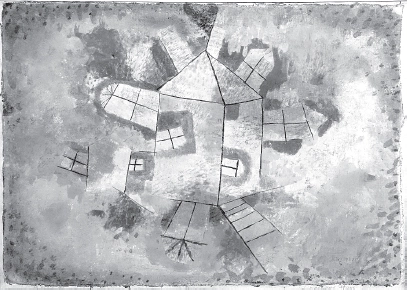Maybe he is not even really walking; maybe he is only dreaming that he is walking. This suspicion may arise fleetingly in the reader.
Krambacher enters a secluded alley. A dim light attracts his attention. A dubious looking tavern, open on New Year’s Eve? But why so quiet? He goes nearer; no trace of a tavern: faded wood lettering above a whitewashed shop window from which the milky light seeps spell: IMPERIAL PANORAMA.
He wants to pass by but a mucky piece of paper in the window holds him back: Today! Gala performance. Journey through the old year! Krambacher hesitates, timidly opens the door and, since he cannot see anyone, rallies himself to enter. There stands the Imperial panorama. Now it is described with the thirty-two chairs in a round. On one of these chairs the owner – a widowed Italian, Geronimo Cafarotti – is asleep. As the guest approaches he leaps to his feet.
Great gush of words. One can gather from his speech that every evening the place is sold out; today, coincidentally, few guests despite the gala performance; ‘but I knew that someone would come: the right one.’ While he urges the visitor onto a stool before two peepholes, he explains: ‘Here you are going to make a curious acquaintance; you will see a gentleman who bears no resemblance to you: your second self. You have spent the evening reproaching yourself, you have an inferiority complex, you feel inhibited, you blame yourself for not following your impulses. Well, what are these impulses? That’s the pressure of your second self on the handle of the door that leads to your life. And now you will recognise why you keep this door closed, have inhibitions, don’t follow your impulses.’
The journey through the old year begins. Twelve images, each with a caption; in addition, the explanations of the old man who slides from one chair to another. The images:
The path that you wanted to take
The letter that you wanted to write
The man that you wanted to rescue
The seat that you wanted to occupy
The woman that you wanted to follow
The word that you wanted to hear
The door that you wanted to open
The costume that you wanted to wear
The question that you wanted to pose
The hotel room that you wanted to have
The opportunity that you wanted to seize
On some of the images the second self can be seen, on others only the situations in which it wanted to embroil the first. The images are described just as they begin to detach from their positions with a quiet ringing, allowing subsequent ones to take their place. Barely have they settled with a quiver when they already begin to make way for a new one. The last ringing is submerged in the clanging of the New Year’s bells. Krambacher wakes up in his chair, an empty punch glass in his hand.
—
Translated by Sebastian Truskolaski.
Written c. 1930–3; unpublished in Benjamin’s lifetime. Gesammelte Schriften VII, 296–8.

Revolving House (Dreh Haus), 1928.
In the dream – I dreamt it for three or four days, and it won’t leave me – there was a country road in front of me in the darkest twilight. Tall trees lined both sides, and on the right-hand side it was bordered by a wall that soared high. While I stood in a group of people, the number and sex of which I no longer know (just that there was more than one), at the opening to the road, the ball of the sun appeared faintly between the trees, almost covered by the foliage, as white as mist and without any radiating force, and without becoming noticeably brighter. As fast as the wind I rushed on my own along the country road in order to be blessed by a more open view; then, in a moment, the sun vanished, neither sinking nor behind clouds, rather as if it had been extinguished or removed. Instantly it was a black night; rain, which completely softened the road under my feet, began to fall with tremendous force. Meanwhile, I wandered around, feeling nothing. Suddenly part of the sky flashed white, neither from the sunlight nor from the lightning – I knew it as ‘Swedish light’ – and one step ahead of me lay the sea, into the middle of which led the road. Beatified by the brightness that I had now indeed attained and the timely warning of danger, I ran triumphantly back along the street in the same storm and darkness.
* * *
I dreamt of a student revolt. Sternheim1 somehow played a role, and later he gave a report of it. In his papers, the sentence appeared word for word: When one sifted the young thoughts for the first time, one found well-fed brides and brownings [Bräute und Brownings].
—
Translated by Sam Dolbear and Esther Leslie.
First published in Ignaz Jezower’s anthology Das Buch der Träume (1928), a volume that includes other dreams by Benjamin, dreams that also appear in One Way Street (1928).
1 comment